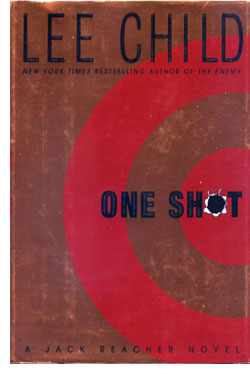 |
 Lee Child
Lee Child
One Shot
Delacorte / Bantam Dell / Random House
US Hardcover First Edition
ISBN 0-385-33668-3
Publication Date: 06-14-2005
350 Pages; $27.95
Date Reviewed: 11-17-2012
Reviewed by: Rick Kleffel © 2012
Index:
Mystery
General Fiction
In an anonymous town in Indiana — American heartland country — we watch a letter-perfect mass-murder unfold. A sniper perches in a parking garage and kills five people. Not long after, a man is arrested. The evidence against him is overwhelming. His guilt is certain. He remains silent until eventually he says: "You got the wrong man." Then: "Get Jack Reacher for me." With laconic, iconic precision the narrative unfolds until a day or two of your reading time has vanished.
It's easy to both underestimate and overestimate the fine machinery that goes into Lee Child's Jack Reacher novels. They can be easily underestimated because they roll out with a stark simplicity and don't feature a complicated or conflicted main character. They don't make social statements or examine cultural mores. They have a very abrupt beginning, a relatively straight through-line, an abrupt ending and lots of action. On the surface, there does not seem to be a lot going on other than plot.
It's easy to overestimate them because they are brilliantly written with a kind of fine focus and control that suggests formal minimalism with absolutely no scholarly baggage. They are so supremely attention-getting that you can read them while a television is blaring the background and have no idea what's on TV. They're clearly smart, addictive and well-written. They're impossible to ignore, difficult to put down and obviously the work of a highly-skilled writer.
'One Shot' is the Jack Reacher version of the locked room mystery. The evidence at the crime scene essentially locks in one man, James Barr, who once crossed paths with Reacher back in the Army. Even Reacher is convinced. But of course Barr insists otherwise, and Reacher finds himself working with his defense attorney and sister, even as the case quickly grows more complex and much more dangerous for all involved.
Child's ability to plot around the taciturn Reacher is verifiably astonishing. Here, he manages more than a few surprises under circumstances that don't make them easy. There are some entertaining red herrings, and some obvious clues readers will see that the characters will not. The characters that show up for this novel are a great batch. Barr and his sister are down on their luck as they circle the drain of American poverty. Barr's defense attorney, Helen Rodin, is nicely under-experienced. The DA is her father, Alex Rodin, a brass-plated jerk, and the detective in charge, Emerson, has a feel of weary competency.
On the other side of the tracks, Child cooks up a wonderfully crooked county plot, the sort of thing you see in the "B" section of your newspaper. There's a pretty big cast at work here, and Child makes them all vividly real. He also makes them all vividly unlikable, so as the Reacher moves through the ranks, we're happy to see them meet the Reacher.
'One Shot' delivers all the fixtures we want in these novels; Reacher's always useful silence, prose clipped to what seems to be the letters themselves, and a variety of payoff moments that are certain to make readers laugh out loud. The comedy of revenge is a key element in Child's novels. Child evokes an emotion that is very difficult to pin down, but when it happens, it's always enjoyable. You can't hel;p but make a noise when you encounter these moments, part-bark, part -laugh, part "Hell, yeah!"
'One Shot' demonstrates Child's incredible prose prowess with every sentence, and his powerful use of plot to drive home the pleasure of reading. It will engulf your life, absorb your attention and reward the effort you put into reading it with serious pleasure. And this is the key to Child's work. He's a superb purveyor of reading pleasure. 'One Shot' is a perfect example of this. It's fun, low-key and grittily realistic. It's a smart close-up of a small cross-section of America as seen by an eternal, classic American outsider. It says enough — and not a single word more.
|
 |




